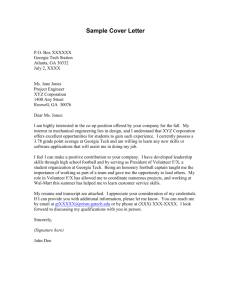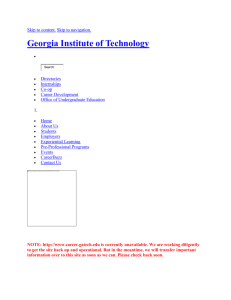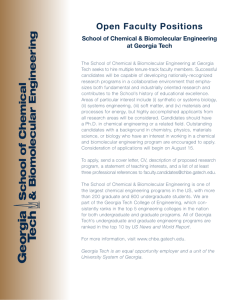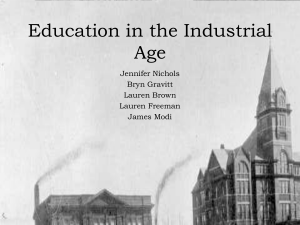Why a Research Data Needs Assessment? - SMARTech
advertisement
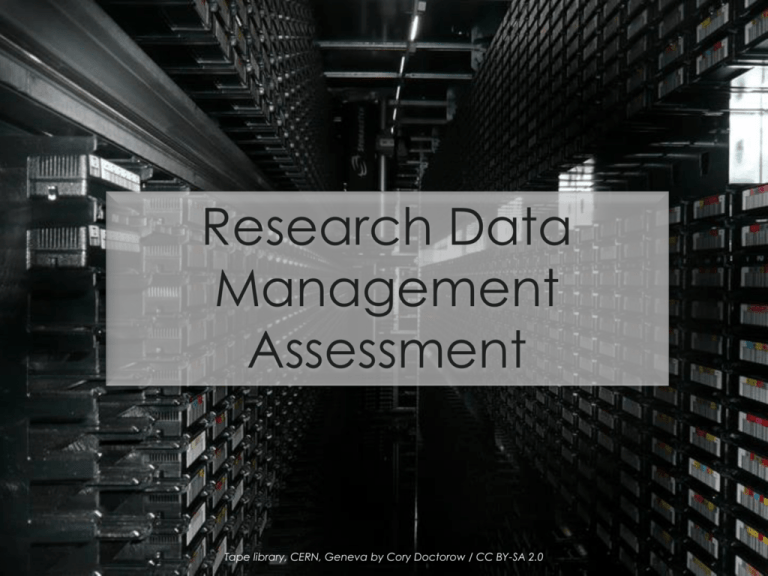
Research Data Management Assessment Tape library, CERN, Geneva by Cory Doctorow / CC BY-SA 2.0 Why Research Data Needs Assessment? • Data Management Plan requirements (and high levels of federal grant funding) • Interest in treating research data as important scholarly work • Growth area for academic library support Research Data Needs Assessment at Georgia Tech Chris Doty, Susan Wells Parham, Lizzy Rolando, and Alison Valk Southeastern Library Assessment Conference October 21, 2013 Data Asset Framework (DAF) GT Methodology Survey Interviews DMP Analysis Case Studies Survey Pilot • Based on DAF examples • Tested by at least one researcher from every College • Modified based on feedback before wide deployment Parham, S. W. (2010). Testing the DAF for implementation at Georgia Tech. 6th International Digital Curation Conference, Chicago, Illinois. http://hdl.handle.net/1853/39786. Survey • Live 2010-2013 • Drupal website with required CAS authentication • Representation from all across the Institute • Self-selected sample Parham, S. W., Bodnar, J., & Fuchs, S. (2012). Supporting tomorrow’s research: Assessing faculty data curation needs at Georgia Tech. College & Research Library News, 73(1), 10-13. http://hdl.handle.net/1853/48706 Survey Sample 30 Number of Participants 25 20 15 10 5 0 College of College of College of College of Ivan Allen College of Architecture Business Computing Engineering College of Sciences Liberal Arts CETL Georgia Tech Colleges and Research Centers GTRI EI2 Interviews 10 Interview questions “How do you organize the data produced from your research?” “How important is it for you or others to have access to your data over the longterm?” Interview Sample 9 Number of Participants 8 7 6 5 4 3 2 1 0 College of Architecture College of Computing College of Engineering Ivan Allen College of Liberal Arts College of Sciences GTRI Georgia Tech Colleges and Research Centers EI2 DMP Analysis • Reviewed DMPs submitted to NSF between Jan. 2011 – Sept. 2011 • Searched for o Repository services o Inter- and intradepartmental sharing of DMPs, o Use of cloud tools • Not self-selected sample Parham, S.W., & Doty, C. (2012). NSF DMP content analysis: What are researchers saying? ASIS&T Bulletin, 39(1), 3738. http://hdl.handle.net/1853/48707. Case Studies • Aerospace, astrophysics, and computing • Included preliminary interview • Assessed both researcher needs and Library capacity Data Analysis • Grounded Theory Lite • Coding and Codebook o Checks for inter-coder reliability • Interviewee Personas Transcribe interviews Web application for Qualitative and Mixed Methods research Visualize major discussion points or code correlations Coding The Good. The Not So Good. Good • Multiple methods • Campus engagement • Learning through doing Not So Good • Codes that are too broad • Un-representative sample • Differences between what people say and what people do Assessment Findings 1. Data management plans are still a frustrating burden for most researchers. 2. Georgia Tech researchers lack the guidelines, resources, standards, and policies to properly care for their research data. 3. A disconnect exists between the expectations of Principal Investigators and Graduate Assistants. 4. Researchers recognize the importance of documentation and metadata, but few capture this information adequately. 5. Sharing data with collaborators outside Georgia Tech is challenging. 6. Researchers are willing to share their data, but the conditions under which they are willing to do so vary widely. 7. Researchers rarely plan for the final disposition of their research data. 8. Very few researchers deposit data into repositories. Rolando, L., Doty, C., Hagenmaier, W., Valk, A., & Parham, S. W. (2013). Institutional readiness for data Stewardship: Findings and recommendations from the research data assessment. http://hdl.handle.net/1853/48188. Next Steps • Changes to local service • Proposal to Campus Administration • Research data repository • IMLS grant to examine DMP’s • Re-Assess References Data Asset Framework: Implementation Guide. http://www.dataaudit.eu/docs/DAF_Implementation_Guide.pdf. Glaser, B. & Strauss, A. (1967). The discovery of grounded theory: Strategies for qualitative research. Piscataway, NJ : AdlineTransaction. Parham, S.W., & Doty, C. (2012). NSF DMP content analysis: What are researchers saying? Bulletin of the American Society for Information Science and Technology, 39(1), 37-38. https://smartech.gatech.edu/handle/1853/48707. Parham, S. W., Bodnar, J., & Fuchs, S. (2012). Supporting tomorrow’s research: Assessing faculty data curation needs at Georgia Tech. College & Research Library News, 73(1), 10-13. http://smartech.gatech.edu/handle/1853/48706. Parham, S. W. (2010). Testing the DAF for implementation at Georgia Tech. 6th International Digital Curation Conference, Chicago, Illinois. smartech.gatech.edu/handle/1853/39786. Rolando, L., Doty, C., Hagenmaier, W., Valk, A., & Parham, S. W. (2013). Institutional readiness for data Stewardship: Findings and recommendations from the research data assessment. https://smartech.gatech.edu/handle/1853/48188. Contact Information Lizzy Rolando Research Data Librarian Georgia Institute of Technology lizzy.rolando@library.gatech.edu library.gatech.edu/research-data
